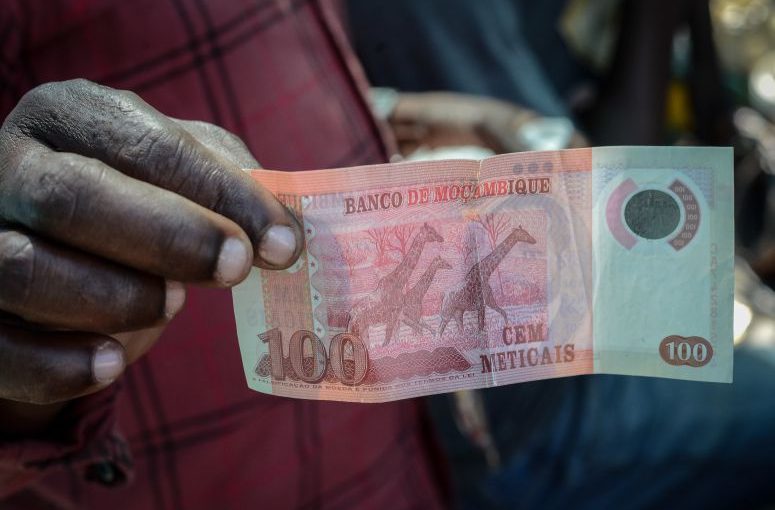Mozambique: Digitalising public administration will cut corruption - president
Mozambique: Questions raised over the rising metical – Carta

in file CoM
One United States dollar (USD) now costs 55 Meticais, after peaking at Meticais within the last 12 months, because of the global crisis caused by the Covid-19 pandemic. This exponential depreciation against the national currency, the Metical, is raising questions in all aspects.
In addition to the US dollar, the value of the Euro is also falling against the Metical. The Euro cost 91 meticais at the end of February, but by last Thursday (15) cost 65 Meticais, according to the exchange rate of the Bank of Mozambique.
The Metical is also gaining ground in relation to the Rand, albeit at a slower pace. Last Thursday, one Rand cost 3.8 Meticais, against 5 Meticais earlier this year.
The appreciation of the Metical against these currencies, particularly the US Dollar, which started at the beginning of last March, raises several questions.
The questions are centred on the fact that the Metical is appreciating at the same time as the country’s economy is in recession as a result of the global pandemic crisis, armed attacks in the centre of the country, war in the province of Cabo Delgado and weather events which, when combined, devastate the investments and the production of the companies, mainly the majority micro, small and medium enterprises.
In view of this, the question arises: what is the reason for the appreciation of Metical? And, will the appreciation of the Metical – up to the levels it is currently enjoys – be beneficial for the economy?
Reasons for the Metical’s appreciation
Starting with the reasons for the appreciation, the report released last March by the Bank of Mozambique on the Economic Situation and Inflation Perspectives points as a factor in the appreciation of our currency to the fully satisfied demand for foreign exchange, as a result of greater fluidity in the foreign exchange market, as well as monetary policy measures taken by the central bank in January, which included the adjustment of reference interest rates.
Meanwhile, the Executive Director of the Confederation of Economic Associations of Mozambique (CTA), economist Eduardo Sengo, indicates as reasons for the appreciation of the Metical against the US dollar measures recently taken by the Government of the United States of America, namely the approval of a US$1.9 trillion package to relaunch the US economy.
Sengo does not rule out the possibility that the US dollar’s abundant existence in the national financial market is due to the drastic reduction in imports due to the pandemic crisis.
A fourth reason for the appreciation of the Metical against the US dollar and other currencies, presented by economist and academic João Mosca, is that the appreciation of the Metical may be due to the fact that the Bank of Mozambique is injecting foreign currency in the national financial market that had been reserved for imports of goods and services for different sectors of the economy.
Up to what levels will the Metical appreciate?
The exchange rate has been appreciating in the last 45 days and, in that period, the Metical recovered 21 points against the US dollar. And the trend of continued appreciation of the Metical seems set to continue. In view of this, there are those who ask, when the scenario will stabilize and at what levels. No one knows for sure.
However, in a webinar on the subject that took place this Wednesday (14), the CTA’s Eduardo Sengo said that appreciation could level off in May, the month in which the United States will achieve herd immunity and begin to reduce the stimulus to the economy. Although advancing this idea, neither he nor any other participant in the event organized by the Mozambican Association of Economists (AMECON) were able to predict the levels which the appreciation will reach.
Impact at all levels is there
Even with uncertainties about when and at what levels the Metical will stop appreciating, the fact is that the impact of the depreciation of the US dollar and other currencies is already being felt in the national economy. The impact is positive, on the one hand, and negative, on the other.
In an interview with Carta de Moçambique, the businessman and member of the Board of Directors of McNet, the company that manages the Single Electronic Window, Kekobad Patel, said that the appreciation of the Metical is pleasing to the importers, as they spend fewer dollars [in their activity], but is stifling exporters and producers, who must spend more dollars to take their products abroad.
Invited to the debate by AMECON, the economist and former Financial Director of the Hydroelectric of Cahora Bassa (HCB), Manuel Gameiro noted that the Metical appreciation is harmful to companies whose assets are in foreign currency (as it devalues their assets), but benefits businesses with foreign currency debt, because the lower the value of the dollar (as a result of depreciation), the lower the debt to be repaid.
Still in the context of the effects of the Metical appreciation, we contacted Pacheco Faria, a businessman in the tourism industry. He said immediately that the exchange rate appreciation was severely affecting economic agents in that sector, because his business is similar to exporters, who are also hit.
“For us, it is a loss, because when the tourist arrives from abroad, he spends foreign currency whose equivalent in Metical is less,” said Faria. In other words, this would mean that the higher the value of the dollar, the better the tourism business in Mozambique fares.
When will the phenomenon decrease prices?
In debate, AMECON touched on this issue, but the economists were unable give precise information. Eduardo Sengo, who also represented then CTA, stressed that a price drop may occur, once orders placed with the rising US dollar were exhausted. He stressed that the US dollar imports take up to three months to reach the country, while those requested in Rands take no more than two weeks, thanks to our proximity to South Africa, on which our country is largely dependent.
To summarise Sengo, the longer it takes to import, the longer for the prices to fall and the same for products imported based on the Rand, whose process is relatively short.
What is being asked of the central bank?
Economists and businesspeople are unanimous in saying that the Bank of Mozambique should take measures to stabilise the exchange rate, because the current rate of change creates uncertainty for the economy.
For Kekobad Patel, reversing the current appreciation of the Metical is the best measure, because the costlier it is to export, the more the government will automatically be required to subsidise the process as a way of minimising the losses of exporting agents or producers.
By Evaristo Chilingue












Leave a Reply
Be the First to Comment!
You must be logged in to post a comment.
You must be logged in to post a comment.